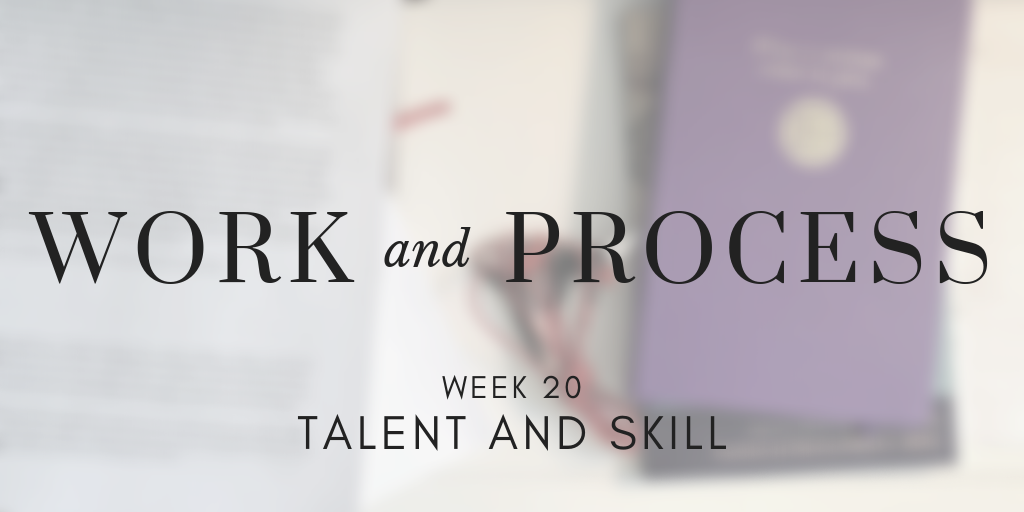|
I know I was going to talk about significant concrete detail this week (and I will, next time!), but last week’s discussion of experience and creative instinct got me thinking about the ways we conceive of artistry and how, I think, that’s linked to the ways we conceive of artists.
First, I think it might be helpful to define some terms. Personally, I believe that creative work comes from two places: talent and skill. Talent, I think, is something you’re born with. Some of us get more of it than others. Some of us get it in certain areas. That’s fine, I suppose, but I don’t think that it’s actually that important. For example, I was talking with a couple of poets the other day, and the subject of meter (a fancy and more structured way of talking about rhythm, I think) came up. You may remember meter from your English courses, practicing scansion, isolating trochees, spondees, and iambs, counting stressed and unstressed syllables: da DA da DA da DA… I remember my instructors warning the class that our study of meter was coming up. It’s going to be hard, they said. It’s going to be tedious, they said. It’ll be on the midterm, though, so you’d better learn it now. But I... loved... it. Without thinking too hard about it, I could “hear” (or maybe the correct word is “feel”) the different beats in a word or combination of words. I thought it was marvelous--so powerful and, at the same time, almost undetectable. I’d always assumed that my training in music (piano, flute, guitar, choir) made scansion easier for me, but one of the poets I was talking to said she had a musical background, too, and still didn’t feel like scansion came easily to her. I’ve never really considered myself talented--in the past, I’ve said that I only feel naturally good at one thing when it comes to writing, and that’s coming up with a cool idea (although lately I’ve even begun questioning that)--but for a second I did have that thought: Whoa, maybe I do have talent. Quickly followed by, So what? Maybe talent can make you more sensitive to certain aspects of art or make certain things (like scansion) a little easier, at least at the outset. But I think the impact of talent is generally negligible when compared to skill. I believe skill is something you work at. Something you practice. Something you get better at only with time, effort, and (often) guidance. It doesn’t matter, for example, if I can hear the rhythm in a line of poetry if I don’t have the skills to use that in my own work. I mentioned back in Week 4 that one of my two universal pieces of writing advice is to always keep learning, and I’m absolutely talking about skill. (Related, Kameron Hurley, author of The Mirror Empire and The Geek-Feminist Revolution, has a fantastic post on persistence and how learning and increasing your skills and not giving up is more important than talent in a career in the arts.) Skill, I think, is what really matters, not only because it means you’re not born with a finite amount of artistry in you and once you hit your limit, too bad, but also because it means there’s hope. Sometimes I look at my peers, whom I respect and whose work I admire, and think they make the work look so easy. It comes so naturally to them. They produce beautiful, thought-provoking art as effortlessly as I would turn on a faucet, and I sit here trying to wring out just one artful word from this dumb, dried-up brain of mine. It’s discouraging, feeling like you’ll never measure up to your contemporaries because they’re just so much more talented than you are. But here’s what I try to remind myself: Art that looks effortless is often the product of years of work. Last week, for example, when I was talking about creative instinct, I didn’t mean instincts we were born with--I meant instincts we develop through experience, practice, and work. If I know, without consciously thinking about it, that a scene isn’t working, it’s not because I have a superhuman gift with scene writing. It’s because I’ve written so many scenes now, I know how it should feel when they’re good, and if it doesn’t feel like that, then it’s time to approach it from a different angle. I recently watched Mary Shelley, a film about the woman who wrote Frankenstein, what some call the first science fiction novel, and there’s a scene where all of the little inspirations that have been peppered throughout the movie (she likes to tell horror stories, she saw a demonstration of galvanism on the corpse of a frog) suddenly come together in this frenetic act of artistry. She takes up the pen, and in one quick montage, she scribbles out this seminal work of 19th century fiction! What genius! I think we like to believe that some artists are just born. “True genius” is a more romantic narrative than “I worked hard at this for decades so I wouldn’t suck at it.” And I’ll willingly admit that Mary Shelley may not be the best example, because she was a teenager when she wrote Frankenstein, and because it reportedly did have its origins in a single weekend of telling scary stories. But I feel like I’ve seen this portrayal of the artist before: the prodigy, the virtuoso, the rare person born with so much talent, it was practically inevitable that they make a masterpiece. At least, I’ve seen this portrayal often enough for it be harmful to the rest of us, because if we believe that some things just come more easily to some people, that some people just get to be artistic geniuses, well, then, why should the rest of us even bother trying? No, thank you. Give me the art that’s difficult. Give me the creators that struggle. Give me the understanding that making something really great takes time and effort and probably failure, big and small. Give me a community where we’re all in this together, and maybe someone’s got an ear for rhythm or someone’s got an instinct for plot, but we’re all struggling in our own ways, and we’re all trying to get better. If I haven’t made it clear enough, I want to dispel the illusion that creative work is something divinely inspired, something inherent, something you have to be a one-in-a-million talent to do. Rather, please allow me to draw back the curtain, to rewrite the story: creative work is work. It takes skill more than it takes talent. It takes years. It takes study. It takes practice. It takes patience, determination, and persistence. If you are having a hard time with your project, if you are building up your skill set, if you are developing your instincts, you are not alone. We are all with you. Next week: SIGNIFICANT CONCRETE DETAIL. For real this time, next Sunday at tracichee.com and/or post your own responses with the hashtag #workandprocess. Time to get back on track. <3 Work and Process is a year-long journey of exploring and reflecting on the artistic process, craft, and working in a creative field. Each Sunday, I’ll post some thoughts, wonderings, explanations, and explorations on writing and creativity, and by the end of it, I hope to have 52 musings, examinations, meanderings, discoveries, bits of joy or inquisitiveness or knowledge to share. In each post, I’ll also include a topic for the following week, so if you happen to be inspired to question/wonder at/consider your own work and process, you’re welcome to join me. We’ll be using the #workandprocess hashtag across all social media platforms, and I hope we find each other to learn and connect and transform on our creative wanderings. Comments are closed.
|
ARCHIVES
February 2024
CATEGORIES |


 RSS Feed
RSS Feed